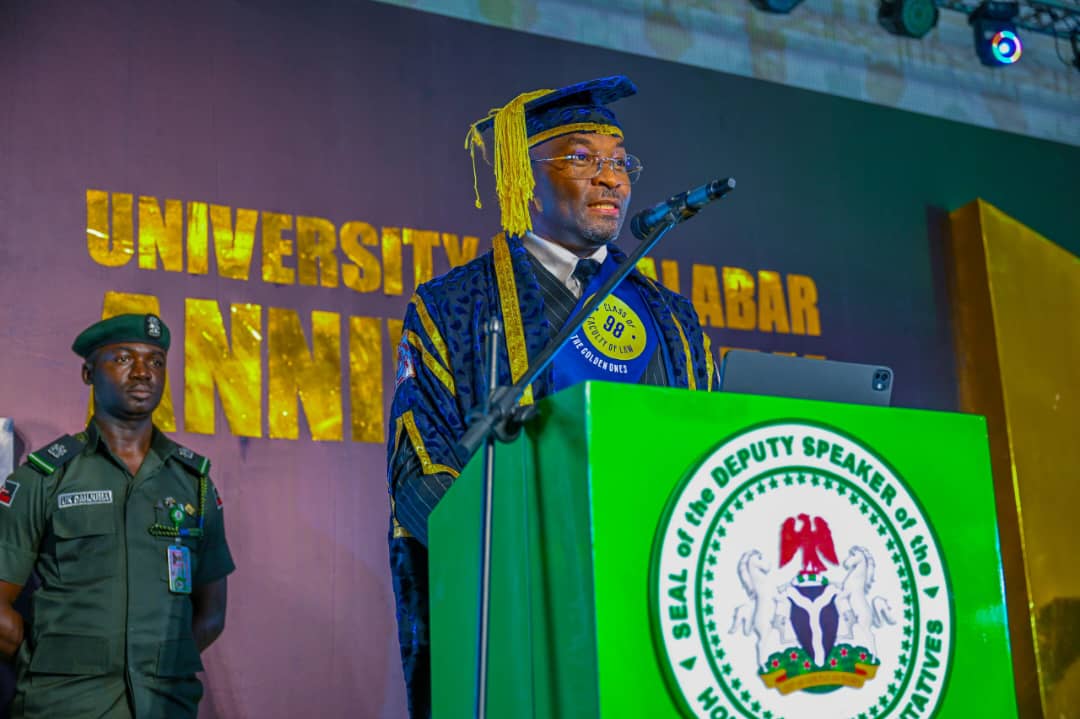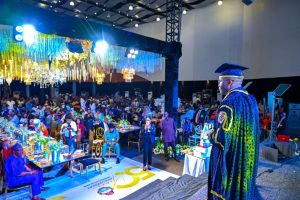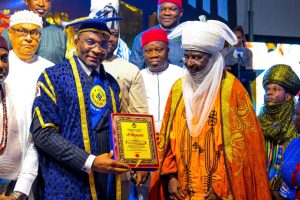News
Deputy Speaker Says Nigerian Universities Must Impact Citizens+PHOTOS

By Gloria Ikibah




News
Pregnant woman found hanging from tree in Anambra

By Francesca Hangeior
Tension gripped residents living along the Uke/Ideani Road in Idemili North Local Government Area of Anambra State on Tuesday after the lifeless body of a pregnant woman was found hanging from a cashew tree near the roadside.
Although the circumstances surrounding her death remain unclear, it is suspected that the woman either committed suicide or was murdered on Monday night, with her body only discovered on Tuesday morning.
When our correspondent visited the scene on Tuesday, police operatives from the Ogidi Police Division, who had been alerted by local residents, had already evacuated the body and deposited it in the mortuary.
A resident, who identified himself as Ogbanna Uche, told our correspondent that no one could recognise the deceased before the police arrived to remove her body from the tree.
Uche said, “I own a shop along the road. We woke up this morning to see the lifeless body hanging from the cashew tree. We couldn’t immediately identify the deceased due to the position of the face.
“The incident might have occurred late at night because when people left for their various homes, there was no such sight. It could be a case of either suspected murder or suicide.”
Another resident, identified simply as Chinwe, said the nature of the incident suggested either suicide or murder, adding, “Incidents like this are rare in this area. That’s why people were shocked. No one could identify the deceased before the police arrived to evacuate the body.”
The Spokesman for the Anambra State Police Command, SP Tochukwu Ikenga, confirmed the incident in a press statement on Tuesday.
Ikenga said the Commissioner of Police had ordered a thorough investigation into the case.
He added that the police were working with residents of the area to uncover those responsible for the suspected murder.
He said, “The Commissioner of Police, CP Ikioye Orutugu, on May 6, 2025, called on stakeholders and community leaders in Idemili North LGA to assist with information to help identify those behind the suspected murder of a pregnant woman found hanging from a cashew tree along the Uke/Ideani Road.
“The CP described the incident as unfortunate and a stark example of ‘man’s inhumanity to man’, and he ordered a thorough investigation to identify and prosecute the perpetrators.
“To this end, the Command urges members of the public to help identify the deceased, as police operatives from Ogidi Division have recovered the body and deposited it in the mortuary.
“Further updates will be communicated as the investigation progresses.”
News
Two Abuja co-wives hospitalised after taking herb to s3xually arouse their husband who married third wife

By Francesca Hangeior
Two co-wives residing in Dakwa community, Bwari Area Council of the Federal Capital Territory (FCT), have reportedly been hospitalised after they drank a herbal mixture with the intent to s3xually arouse
their husband, who recently took a third wife.
The herb, popularly called ‘kayan mata’ in Hausa language, is said to be taken in order to arouse greater s3xual desire in male partners.
According to reports, the women, names withheld, allegedly took the herbs three days after their husband wedded a third wife from his home town in Gusau, the Zamfara State capital.
The husband in the centre of the herbal arousal story, Musa Muhammad, while confirming the incident to the publication, said his two wives were rushed to a clinic in neighbouring Madalla town in Niger State, where they were diagnosed with damage in some of their organs allegedly caused by the herbs they consumed.
He revealed that the two women underwent surgery at the hospital and were discharged on Monday.
The husband further revealed that it was gathered that a herbalist usually supplied them with the liquid herb preparation which they mixed with milk before drinking, but that this time around, she gave them a different one, which was in powdered form.
“My attention was called from my main house that my two wives were not feeling fine because I passed the night at a different house where my new bride is residing,” he narrated.
“So, I rushed there and found them rolling on the ground, complaining of stomach pain. Initially, I invited a nurse from within the community who placed them on drip, but without any improvement. So, I took them to a clinic in Madalla town where they underwent a test and surgery.
“They were discharged after about a week there,’’
Muhammad further disclosed that a search to locate the female herbalist was on to get her investigated and save others from being her next victims.
A medical doctor, Mrs Taiye Anifowose, has warned women to desist from consuming such herbs, saying they could be dangerous to their organs.
Taiye, who is a gynaecologist, said such herbs could also affect their reproductive system in the long run.
She called for proper enlightenment by the relevant government agencies, families and communities’ leaders on the dangers associated with such herbs.
News
Midwives critical to reducing maternal, newborn deaths in Africa – WHO

By Francesca Hangeior
The Acting World Health Organisation Regional Director for Africa, Dr Chikwe Ihekweazu, has commended the lifesaving work of midwives across Africa, describing them as the frontline guardians of maternal and newborn health.
In a message to commemorate the International Day of Midwife on Monday, Ihekweazu stated that midwives were critical actors in every health crisis and decried the 6.1million health worker shortfall.
The 2025 theme is “Midwives: Critical in Every Crisis.”
He decried the maternal and newborn death rates in the region, further emphasising that the efforts of midwives have been important in reducing maternal mortality.
The WHO noted that over one million newborns and 178,000 mothers die every year in the region.
While South Sudan accounts for the highest maternal mortality rate in the world, Nigeria ranks third with 512 deaths and 100,000 live births.
In a message on the WHO website, Ihekweazu said, “Aligned with the momentum of World Health Day 2025 and its theme, Healthy Beginnings, Hopeful Futures, this year’s celebration calls for greater recognition and investment in midwives, the people who make healthy beginnings possible.
“In the African Region, where over one million newborns and 178,000 mothers die each year, midwives are a lifeline. They deliver skilled, compassionate care across the entire continuum of reproductive and maternal health, often in the most difficult and resource-limited settings. Their efforts have been pivotal in reducing maternal mortality, with the regional average dropping from 727 deaths per 100,000 live births in 2000, to 442 in 2023.”
He noted that the 2025 theme reflects a challenging reality, stating that midwives serve in fragile health systems, conflict zones, and through natural disasters and pandemics.
“In many cases, they are the only providers of sexual and reproductive health services in their communities,” he added.
The Acting Regional Director further noted that despite a projected shortage of 6.1 million health workers in the African Region by 2030, important progress has been made.
He stated that between 2013 and 2022, the number of midwives nearly doubled, from 173,269 to over 334,000, noting that this growth reflects what is possible with political will, coordinated investment, and focused strategies.
Despite the growth in the region, Nigeria is currently facing a mass exodus of medical practitioners.
PUNCH Healthwise reports that over 7,500 nurses and midwives left the country in five years.
In 2023, the National Association of Nigeria Nurses and Midwives stated that to close the gap caused by the mass emigration, the country needed about 70,000 midwives.
Continuing, Ihekweazu stated that WHO continues to work closely with Member States to expand competency-based midwifery education, improve workforce density, and embed midwives in national health and emergency preparedness strategies.
“In 2024, Member States endorsed the Africa Health Workforce Investment Charter, a shared commitment to long-term investment in health workers. Zimbabwe’s new Investment Compact, for example, will mobilise an additional $166 million annually for three years to strengthen its health workforce, with midwives at the centre.
“Still, too many midwives work without proper tools, pay, protections or opportunities for advancement. Their voices are often excluded from the policy decisions that affect their work, and the lives of the people they serve,” he added.
He urged governments to ensure midwives were integrated into emergency preparedness plans, protected in crisis response and supported with mental health resources and fair working conditions.
“Education must evolve to equip them with skills in trauma-informed care, conflict sensitivity and leadership.
“When midwives are trained, respected and empowered, health systems grow stronger, and every mother and child has a better chance at life.
“WHO stands with midwives, today and every day. Let us move beyond symbolic recognition.
“Let’s act, because midwives are not only critical in every crisis. They are essential to every solution,” the acting regional director said.
-

 Entertainment11 hours ago
Entertainment11 hours agoI’m broke yet accused of money laundering – VDM breaks silence after EFCC release
-

 News20 hours ago
News20 hours agoJust in: Finally, EFCC bows to pressure, releases VDM
-

 News11 hours ago
News11 hours agoEdo police rescue kidnapped PDP chairman, 36 others
-

 News11 hours ago
News11 hours agoTomato Ebola Causes Loss of N1.3 Billion, Contributing to Rising Food Prices
-

 News3 hours ago
News3 hours agoBreaking: Three Serving PDP HoR Members Defect to APC
-

 News4 hours ago
News4 hours agoFinally, IMF deletes Nigeria from its debtors list
-

 News11 hours ago
News11 hours agoSad! Five members of one family die of food poisoning
-

 News21 hours ago
News21 hours agoSad! Mob kills football referee, set corpse ablaze






